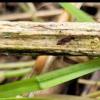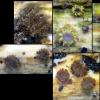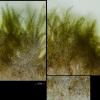
21-01-2026 16:32
Gernot FriebesHi,I need your help with some black dots on a lich

21-01-2026 16:48
Gernot FriebesHi,after my last unknown hyphomycete on this subst

20-01-2026 17:49
 Hardware Tony
Hardware Tony
I offer this collection as a possibility only as e

15-01-2026 15:55
 Lothar Krieglsteiner
Lothar Krieglsteiner
this one is especially interesting for me because

17-01-2026 19:35
Arnold BüschlenHallo, ich suche zu Cosmospora aurantiicola Lite

16-01-2026 00:45
Ethan CrensonHi all, On decorticated hardwood from a New York

18-01-2026 12:24
Hello.An anamorph located on the surface of a thin
Trichopeziza sulphurea on Urtica dioica
B Shelbourne,
14-11-2024 00:34
• Macro and habitat suggest Trichopeziza, confirmed by micro.
• Spores and exudate seem to suggest Trichopeziza sulphurea.
• The browner ones have more or less yellow at the margin and there was brown exudate in micro, but there is a separate folder for 'cf. brown exudate'.
Habitat: On a dead steam of Urtica dioica, in undergrowth, wooded area, damp and shady, in a small valley, 54 m alt., Benfield Hill Nature Reserve, South Downs, southern England, early-November.
Apothecia: 2 yellow, ~10 brownish, gregarious to 3-caespitose, nest-like appearance, greyish with long and bright yellow or brownish hairs, diameter < ~2 mm, sessile, superficial.
Low magnification: Initially globose and covered with hairs, becoming more cupulate when the receptacle opens, receptacle brownish-grey, somewhat translucent, disc becoming lighter, more whitish, appears concave, many long hairs projecting from the margin and receptacle, apparently longer at the margin, sulphureous at the margin and upper flanks and brownish below, or just the margin sulphureous and flanks brownish, agglutinated in large clumps, margin remaining raised with marginal hairs erect or enclosing the disc.
Asci: Turgid ~100-110 x 9.5-10.5 µm, 2-4-seriate, simple septa, rings rb, occasionally dirty pre-KOH, Calycina-type, ascoplasm medium dextrinoid when mature.
Spores: Long and narrow, cylindrical-allantoid, 0-3 (5?) septate, some septate in asci, multi-guttulate, filled with many small guttules and some medium-size ones, OCI 4-5, very sensitive and guttules coalescing almost immediately in water, and becoming narrower (~2-3 um).
Free living spores in water or mature asci:
(30.0) 31.1-38.3 (39.8) × (3.0) 3.2-3.5 µm, Q = (8.9) 9.2 - 11.9 (12.0), N = 10, mean = 33.9 × 3.3 µm, Qe = 10.4.
Paraphyses: Lanceolate, apex rounded, width ~3.5-4.5 µm, apical cell often longer, up to 3x longer than cell below, filled with a hyaline refractive VB (Calycina-type), also with a narrow ellipsoid inclusion (SCB?), no branching observed above the base.
Hairs: ~150-170 x 4-5 µm, gradually tapering to a rounded end, more acute when mature, multi-septate (~10?), cells becoming longer towards the apex, sometimes cells more sub-globose around the base, surface appears slightly rough or pruinose, walls hyaline but appear to have some chlorinaceous contents (pre-exudation), with lots of brownish to yellowish-greenish (sulphureous) resinous exudate, more reddish-brown around the base of the hairs, remaining as many medium-size globose to pyriform drops attached to the hairs.
Medullary: Possibly text. porrecta.
Ectal: Text. globosa-angularis to prismatica, appears hyaline at the base and reddish-brown above, smaller cells around the bases of the hairs, more prismatica near the margin.
Hans-Otto Baral,
14-11-2024 11:06

Re : Trichopeziza sulphurea on Urtica dioica
Yes, an easy species. The brown ones in the separate folder are very probably not distinct.




 Hymenium-0029.jpeg
Hymenium-0029.jpeg